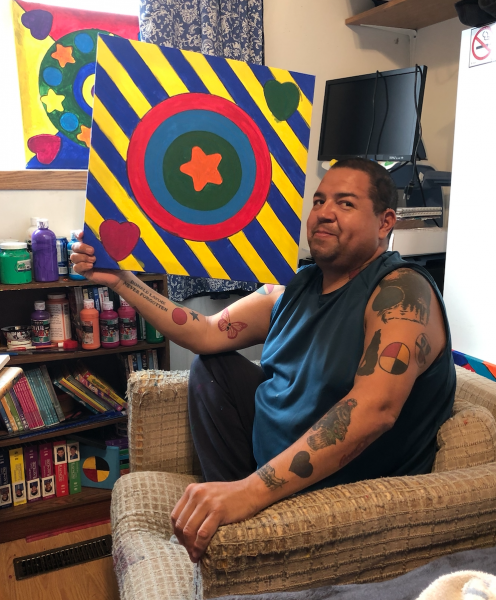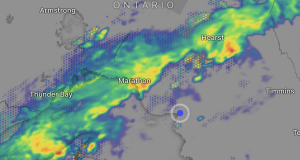“Since the outbreak of COVID-19, I’ve had to be much more independent. I can do a lot; I am proud of this,” says David. David lives in the small town of Pic River, more than 3 hours east of Thunder Bay. He is creative, active, and a hard worker. David is also deafblind.
In Ontario, an estimated 211,250 individuals are deafblind, like David. Deafblindness is a combination of varying degrees of hearing and vision loss that is unique to each person, and can impact access to information, communication, and mobility.
“I come from a big family, but I am the only one with deafblindness. However, I am not completely blind; I see best out of my left eye and I have some hearing too,” says David.
He is supported by Superior Greenstone Association for Community Living in partnership with DeafBlind Ontario Services, through their Community Services – Partnerships. This program offers specialized expertise and services to the individual with deafblindness through their supporting agency. Every partnership is uniquely designed to ensure the needs of each individual are met in collaboration with the supporting organization. Community Services – Partnerships provides David with access to Intervenor Services so he is more independent in his community and able to achieve his goals.
Intervenors are professionally trained to act as the “eyes” and “ears” of the individual with deafblindness through the sense of touch. With the support of his intervenor, David has a part-time job, rides his bike, and has even overcome his fear of water, swimming 50 laps of the pool on each visit.
Until mid-July, David did not have access to an intervenor for months due to COVID-19. “Because I didn’t have an intervenor, I had to be more independent at work, as well as doing errands and going to doctors appointments on my own. It was rough, but I got through it,” says David. David also continued to work his part-time job at Circle K, where he has worked for the last 4 and a half years, without the support of an intervenor. He often works in the back of the store, making it easier for him to social distance.
David wears a mask to help prevent the spread of COVID-19, noting that it does interfere with his eyesight. With one eye stronger than the other, wearing a mask makes it more difficult for David to focus his vision. He also finds it hard to walk with it on, but, it’s “how we have to live right now.” Face masks and coverings can create a communication barrier, especially for people with sensory loss. “When speaking to me, people have to remember that I am deafblind. Telling me who they are as well as speaking loudly and clearly help me in communicating and interacting,” says David.
In mid-July, David started receiving support again through an intervenor, Sam. “I am happy to have Sam’s support. She helps guide me on where I am going if I am not using my white cane. She also helps facilitate communication if I can’t hear someone clearly. Things are easier with her support.”
“We are going with the flow and taking things day-by-day. We are doing activities of daily living completely different than before COVID-19… It’s a learning process,” says Sam Atkins, David’s intervenor from Superior Greenstone Association for Community Living. “David demonstrates his increased independence that he built during his time without an intervenor. He continues to learn new skills and it’s rewarding watching him take new things in,” says Sam.
David is deafblind, but this has not stopped him from living his life to the fullest. His independence and resilience, especially during challenging times like these, are increasingly apparent.
SOURCE DeafBlind Ontario Services – DeafBlind Ontario Services takes a holistic approach to providing Intervenor Services that are customized to each individual’s unique needs, method of communication, and goals to increase their independence and enrich their life. With programs across the province, their reach extends into a wide range of communities in Ontario. Learn more, visit www.deafblindontario.com.
- SSM RotaryFest Take Your Pick Draw is back - July 4, 2025
- Thank You – M.H.S. Graduation 2025 - July 2, 2025
- Men’s NIght Golf – June 26 - July 1, 2025
 Wawa-news.com You can't hear the 'big picture'!
Wawa-news.com You can't hear the 'big picture'!

